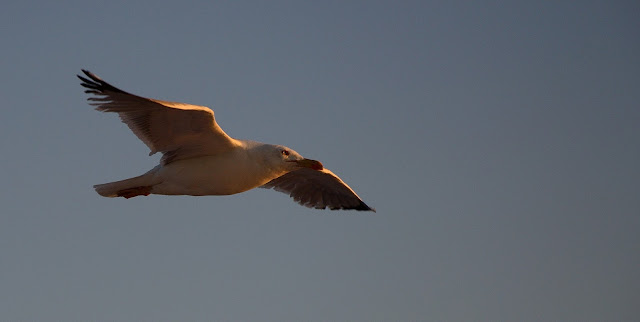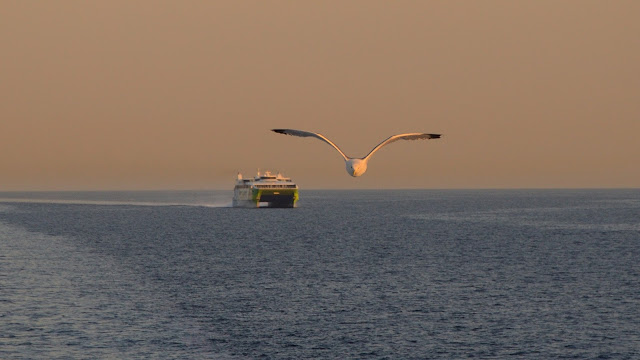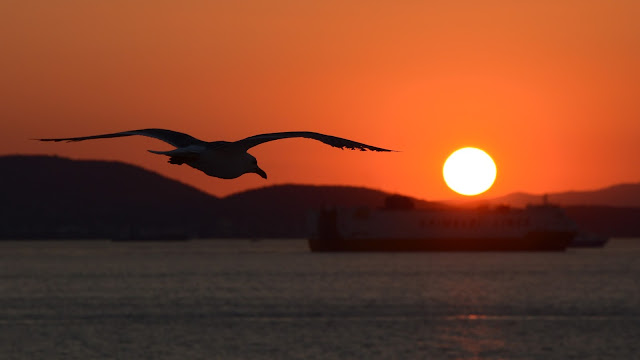Furthermore, last week I shared with you my thinking process behind making a photo, to show you the value of not only seeing a scene, but also anticipating it. Great images are made when you know what will happen in the next few moments, because this allows you to be there (appropriate settings already dialed in) to take the shot.
In today's second part, we'll see the second photographic example, portraying this very fact, namely anticipating. The particular focus, today, will also be on learning to adapt your anticipation in rapidly changing situations.
Case 2: It's a bird, it's a plane, it's a ship!
I was on the ferry back to Piraeus, after my lovely tour of the Greek islands, and thanks to a short but highly serendipitous delay, the ship began approaching the port just at the right time: sunset.
I was seated near the ship stern, and I noticed another ship approaching. Recognizing it as a highspeed catamaran, I expected it would approach our ferry enough for a nice shot. I took my camera and positioned myself near the aft-most railings, waiting patiently. The ferry did cover the distance, but it then began veering to the left, to overtake our boat. I was about to move myself to the side, to get a better shot (though I'd begun to recognize that it wouldn't be as great as I'd imagined), when all of a sudden, the situation evolved.
We were close to land, and I noticed gulls had begun approaching our ferry, circling it. I started focusing my attention on the gulls and noticed their pattern of flying: approaching from the side, they overtook the ferry, then flying by its side, before returning far behind it to repeat the procedure. I took a couple of shots like the one on the top of this page: simple but technically well executed shots of a flying gull. Nice.
However, I immediately realized the potentials for a better composition. Wouldn't it be better to have something in the background, rather than just empty sky? Indeed so, and I now framed against the overtaking highspeed catamaran, hoping a seagull would overfly our ferry from that specific part. It took a few long minutes (in which I'd begun worrying the catamaran would move away from the frame) but it happened:
In all honesty, this shot would've been better with a tele longer than the 105mm of my Nikkor AF-S VR 18-105mm, but hey, no complaints - remember not to whine about what you don't have, but focusing on exploiting every last drop of what you do.
When you focus on experiencing, and when you concentrate on anticipating, magical things can happen. Soon after getting this shot, I began admiring the sunset, trying to find ways to include it in a nice composition.
The first attempt was this one:
Lovely colors, to be sure, though the ship doesn't have enough compositional weight at that position. I began wondering how to emphasize the foreground in a better way and then it struck me.
The gulls!
I locked in the exposure I wanted, then changed my focusing mode to AF-C and activated the burst. The Nikon D3200 has "only" 4fps, but they're more than enough. It's far more important to see and anticipate. I positioned myself against the railings, camera ready against the sunset-bathed mountains in the distance, but my eyes weren't looking through the viewfinder. They were looking behind me, seeing the gulls approaching. Once I saw one that seemed to be coming my way, I got ready to track it.
The first result was this:
This is the photo from last week's article, if you recall. A stunning shot, working in every possible way.
I took several other shots, all quite good, including one with a pair instead of a single gull.
Also an interesting shot, though I still prefer the one above it.
In conclusion, I really must repeat myself:
- No, having 6, 12, 20, or 24 megapixels doesn't matter; framing and composition, does.
- No, having a camera with 23 or 25 bits of color depth doesn't matter; experiencing the world and learning to really see it, does.
- No, having a camera with this many fps or that many AF tracking points doesn't matter; learning to anticipate and adapt in changing situations, does.






No comments:
Post a Comment